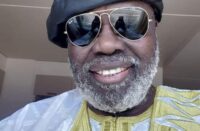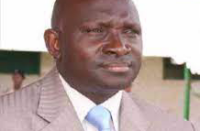 “Sir Dawda Jawara lives peacefully in Gambia and so can Jammeh,” says His Excellency President-Elect Barrow.
“Sir Dawda Jawara lives peacefully in Gambia and so can Jammeh,” says His Excellency President-Elect Barrow.
Presidential Pardon/Amnesty
The question is whether President-Elect Barrow is prepared to offer Out-going President Yahya Jammeh a total and absolute Presidential Pardon? I think the need for a “Presidential Pardon” is why Jammeh went back on his word and rejected the election results once Mrs. Fatoumata Tambajang stated to the Guardian Newspaper that “Jammeh will be prosecuted”.
Jammeh’s rejection of the election results has united the world against him and strengthened President-Elect Barrow’s position. Barrow’s colleague Mrs. Tambajang’s “tactical error” in talking to the London Guardian has resulted in strengthening the new democratic mood in The Gambia (and it has led to Gambian society, apart from the army and the police, rejecting Jammeh publicly – something none dared to do in the last 22 years).
The statements from both ECOWAS and the UN have emphasised that Jammeh must prepare for the transition “unconditionally”. By this I understand two things: that Jammeh is insisting on an all-encompassing “Presidential Pardon” and, secondly, that the international community refuses to endorse Jammeh’s position. When Sir Dawda accepted Jammeh’s “pardon” and the return of his property, the main point of resentment from Sir Dawda’s former colleagues was that Sir Dawda should have demanded the same for all Sir Dawda’s colleagues. I have no doubt that Jammeh’s colleagues will now be insisting that President-Elect Barrow’s pardon must cover everyone and every crime during President Jammeh’s 22 years administration. Otherwise, threatened Jammeh’s colleagues and Jammeh himself: we will fight to remain in power.
When Muhammad Bazzi was reported as visiting President-Elect Barrow recently, I think it was to put to Barrow on behalf of Jammeh the idea of a blanket pardon. I also think Barrow said no, and that is why Jammeh went on TV the very next day to reject the election results.
If I understand the President-Elect’s position on this correctly, it is that “There will be no blanket-amnesty for all the crimes committed in the last 22-years, but also there will be no witch-hunt against Jammeh and the people who worked for him and the new government will adhere strictly to Due Process and the Rule of Law”.
I don’t think the President-Elect will survive in office if he agrees to a general amnesty for Jammeh and his people. The anger of the recently emboldened Gambian people will overthrow the Government of President Barrow if he gives a blanket amnesty for the Jammeh-Era crimes against Gambians.
So what happens? Who will blink first?
I think Jammeh will give way faced with the immovable will of the Gambian people and the international community. He has everything, including his life, to lose if he insists on holding onto power and going to war with the international community. He will, I think, take the Middle Way out.
The Middle-Way, between a war and general amnesty is a mid-night flight out of The Gambia into exile – courtesy of the USA and the Senegalese. The Senegalese Army can then keep the peace and ensure the safety of Barrow and his team up to and after the Inauguration.
The problem for Jammeh may be that he is a prisoner of his soldiers and they may not allow him into comfortable exile while they remain and face the music for his crimes. But let us assume that Jammeh is smart and will be able to leave for exile unarmed. Once that happens, then the new government of President Barrow will be forced by public demand – and the very need to be seen to be doing something to address the gross injustices of the Jammeh Era – the ‘Jammeh Era Crimes’.
Jammeh Era Crimes Charge-Sheet.
These are numerous, but I will list just ten major ones:
1. The 1994 Coup itself: Although most Gambians, including those who later became vehement opponents of Yahya Jammeh’s regime, welcomed the military change of government in 1994, the coup was an unconstitutional act. It was treason against Sir Dawda’s government. President-Elect Barrow’s Coalition Partner and Spokesman Halifa Sallah has held to that position throughout the 22 years, even to the point of refusing to serve in Jammeh’s government. So the new Attorney General may, following Due Process and the Rule of Law, lay charges of treason against Jammeh and his coupist colleagues (afterall, there is no limitation period for that crime).
2. The killing of Jammeh’s Finance Minister Koro Ceesay: This has been well documented in online publications, describing the manner of the killing (with a baseball bat), the description of the place of the killing (Yankuba Touray’s home in Kotu) and the individuals involved in the killing (Yankuba Touray, Peter Singhateh and Edward Singhateh were mentioned). I was once invited to “a meeting” as Jammeh’s plane took off and we got into our car. I said to my cameraman “just like Koro’s invitation” and refused the meeting – even after Jammeh returned!
3. The November 1994 Mass Killing of Soldiers at Yundum Barracks and Bakau Barracks: This was described to the public as a suppression of a counter coup – and the online debate seems to suggest that there was indeed such a coup planned. But it seems that the plan for the coup was leaked – and those suspected were subjected to summary killings. Bodies are said to still be buried in wells in both Yundum and Bakau barracks.
4. The April 2000 killing of students: This was the first and last demonstration of students that threatened to unseat Jammeh’s government and the reaction of the army and the police was brutal. Having personally spoken to two main actors involved, the Chief of Army staff, Colonel Baboucar Jatta and Jammeh’s then Shadow-President Baba Jobe, I was made to understand that the main reason for the killings “was because the security services were losing control and feared immense damage to property”. But I have also heard that there may be a telephone recording at Gamtel where Jammeh, who was in Cuba, ordered the Vice-President to “shoot to kill to teach them a lesson”.
5. The brutal murder of the journalist Deyda Hydara in 2004: I was bringing my party from London to build a Library for Kotu Senior School and Deyda had met us in October. We were to meet him on the 17th December and he was shot dead on the 16th. For ten years Deyda had remain a vocal, balanced, educated and therefore very effective critic of Jammeh’s rule and the killing was to silence him. This may be the easiest case to solve because the man most identified with Deyda’s killing, former Interior Minister Osman Sonko, is in Europe seeking asylum. Assuming that he survives between now and the inauguration of the new government, he will be a gold-mine as a witness to this crime and others.
6. The attempted assassination of Baba Jobe’s senior lawyer from fajara, Osman Sillah. It is suggested that one of the 1994-Junta members who wanted Baba Jobe jailed might be behind the attempt on Sillah’s life – and that Jammeh who knew this later blackmailed the former Junta-member with this crime.
7. The killing of Daba Marenah and Co. in 2006 after the aborted coup. Online theory was that some of Jammeh’s own close associates had knowledge of the coup, but decided to silence Daba Marenah incase he became aware of their involvement and told Jammeh.
8. The disappearance of the journalist Chief Ebrima Manneh in 2006. I understand this was initially instigated by a phone call from the late Dr Saja Taal, Observer MD, to the NIA and the NIA came and took Chief Ebrima Manneh away. Others have spoken of seeing Chief Ebrima Manneh at various places, including Fatoto Police Station. The Fula Police Inspector who I met there in 2008 was not very forthcoming. Others say Chief died at Mile 2 Prison.
9. The Mass Killing of Prisoners in Mile 2 (2012): This was horrendous and many were unlawfully killed, even people who were not serving a death sentence. The aim seemed to put the Gambian population in fear – and it worked. Until …
10. The killing and torture of Solo Sandeng and UDP colleagues in 2016. Solo’s heroic death and the jailing of Lawyer Ousainou Mandela Darboe awakened the Gambian people and led directly to President-Elect Barrow’s victory.
These are ten major crimes of the Jammeh Era that I can think of, but there are numerous others where family members have been quietly arrested in the middle of the night and disappeared. Then there are thousands of families who have been thrown off their ancestral lands because Jammeh and his partners wanted to build massive housing developments for sell. And there are those who have been abducted and raped with impunity. And then there are those whose properties, houses and cars have simply been converted by greedy businessmen with connections to Jammeh and his government. The list goes on and on.
And so I return to the words of President-Elect Barrow on whose shoulders shall rest the burden of dealing with these and other demanding problems:
“Sir Dawda Jawara lives peacefully in Gambia and so can Jammeh”
With utmost respect to the President-Elect, Sir Dawda’s 30-year rule was free of the crimes we listed above for Yahya Jammeh’s rule. My own 14-day unlawful detention was absolutely nothing compared to the beatings, tortured and killings that Gambian citizens suffered under Yahya Jammeh. Can such a man as Yahya Jammeh “live peacefully in Gambia” without soldiers and guns to protect him? Is it wise for such a man to even contemplate “living in Gambia peacefully”?
On a final note, in 2008 I met Sir Dawda sitting all by himself in Standard Chartered Bank waiting to be served. There was no security around him. I shook his hand, thanked him for his benechin in Haywarths Heath, and left him in peace. That was a peaceful man living in Gambia peacefully.
Dida Halake
Notting Hill,
London, UK
Ends

